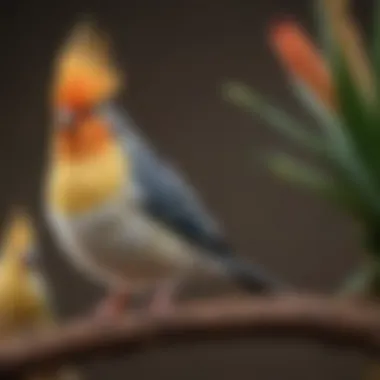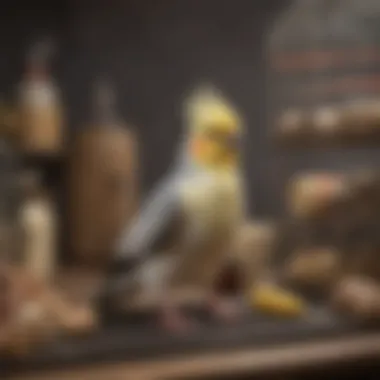Understanding the Cost of Cockatiels at Petco


Intro
Acquiring a cockatiel can be a delightful experience for many bird lovers. As you consider bringing one of these charming creatures into your home, it’s crucial to understand both the initial and ongoing costs associated with cockatiel ownership. Petco, a popular retail chain for pet supplies and animals, is a common option for many prospective bird owners. In this article, we dive deep into the financial commitments required to successfully care for a cockatiel.
The price tag on cockatiels can vary greatly, influenced by factors such as the bird’s age, color mutations, and even the location of the Petco store. But price isn’t the only aspect. Owning a cockatiel involves various ongoing expenses like housing, food, and health care.
The objective here is not just to throw some numbers your way, but to offer a comprehensive guide that helps potential owners plan effectively. We’ll explore the additional considerations like grooming, nutrition, and behavioral training that play a significant role in cockatiel ownership. We want to arm you with information that facilitates responsible pet ownership.
By the end of this article, you’ll be equipped to navigate the costs and prepare for the joyful yet demanding task of raising a cockatiel in your home.
Understanding Cockatiel Pricing
Average Price of Cockatiels
On average, cockatiels at Petco range anywhere from $60 to $150, depending on the bird’s age and other unique traits. Baby cockatiels typically fetch a higher price, while older birds tend to be less costly. Additionally, if you're on the lookout for rare color mutations or specific breeds, be prepared to shell out more cash, as these can push the prices upwards to around $200 or even more.
"Knowing the average price of a cockatiel at Petco is just the start. It's the broader context of care and hidden costs that really shapes the total investment."
Price Variability by Location
Price variability in cockatiels can occur based on your geographical location. Urban areas, where demand is high, often see prices that can be significantly steeper than rural locations. For instance, a cockatiel in New York City might set you back an extra $50 to $100 compared to one in a small town. Moreover, state regulations and local economies can play a role in pricing as well. Always check the specific Petco store or look at their website for local pricing variations.
Seasonal Trends in Pricing
Pricing for cockatiels can also fluctuate with the seasons. Typically, during the spring and summer months, you may find cockatiels priced slightly lower. This is usually when inventory is high, and demand is more steady. Conversely, in the fall and winter, prices may increase as the number of available birds diminishes. Additionally, holidays like Christmas can drive higher prices due to the surge in demand for pet gifts. It’s always wise to consider these trends, as waiting for the right season can save you a few bucks.
Understanding these dynamics of cockatiel pricing can help potential owners navigate the financial waters more effectively.
Factors Influencing Cockatiel Cost
When considering the purchase of a cockatiel, it's essential to understand that the price does not simply reflect the initial cost of the bird. Several factors play a crucial role in determining how much you might be spending. Understanding these influences will not only help in budgeting but also aid in making a responsible choice regarding pet ownership.
Age and Condition of the Birds
Age remains one of the primary determinants in the pricing of cockatiels. Younger birds, particularly those that are just weaned, often come with a steeper price tag. This is likely due to the added effort involved in breeding and raising them in a healthy condition. Typically, a cockatiel that is about 8 to 12 weeks old can be sold for a higher price than mature birds, as they are easier to train and bond with. Additionally, the condition of the bird is equally significant. A bird that has been well-taken care of—showing no signs of illness or stress—will inherently cost more than one that may require medical attention.
"Knowing the age and health of your future feathery friend can save you both money and heartbreak!"
Color Mutations and Breeds
In the world of cockatiels, colors matter—a lot. Various color mutations and breeds can substantially affect pricing. For instance, a normal gray cockatiel might cost less than its fancy counterpart with unique color traits like lutino or pied variations. Collectors sometimes pay a pretty penny for rare colors or specific breed lines, as these unique traits are often bred deliberately and require careful handling. The interest in vibrant and distinctive colors often drives up costs, so if you have your heart set on a particular look, it might take a bigger bite out of your wallet than you intended.
Gender Differences in Pricing
Interestingly, the gender of the bird can also have implications for its cost. Male cockatiels are generally more sought after, particularly because they typically have brighter colors, especially when it comes to species like the lutino or the pearl. Males also tend to chatter more, attracting people who appreciate vocal pets. As such, it is not unusual to encounter female cockatiels at a slightly lower price point. For those who are considering purchasing a cockatiel, knowing the differences in pricing based on gender can definitely help in making a choice that not only fits within budget but aligns with personal preferences too.
Understanding these factors gives prospective cockatiel owners a clearer picture of what to expect in terms of costs, thus guiding them in making thoughtful decisions that span from the initial purchase to the eventualities of ongoing care.


Initial Costs Beyond Purchase Price
When considering the costs associated with bringing a cockatiel into your home, most first-time pet owners often overlook one crucial aspect: the initial costs beyond the purchase price of the bird itself. While many may zero in on the price tag seen at places like Petco, it's critical to broaden that scope to include the expenses necessary for proper care and comfort of the new companion. Ignoring these costs can lead to unforeseen financial strain shortly after bringing the bird home.
Understanding these initial costs can set a solid foundation for responsible pet ownership. This whopping rodeo isn’t just about how much you pay for the bird; it’s also about making sure you provide an environment that fosters its well-being. We’ll break this down into key areas: housing and habitat setup, dietary needs, and necessities for play and enrichment.
Caging and Habitat Setup
Creating a suitable habitat is not only vital for the cockatiel's well-being but also an embodiment of responsible pet ownership. The cage is the sanctuary where a cockatiel will spend a significant amount of its time, so investing in a spacious, sturdy, and well-ventilated cage is non-negotiable. Expect to spend between a hundred to three hundred dollars, depending on the size and design you choose.
Moreover, the cage should be equipped with the following essentials:
- Perches: Different widths and textures encourage foot exercise and comfort.
- Food and Water Bowls: These need to be easily accessible and cleaned daily.
- Substrate: A safe bedding material can minimize mess and promote hygiene.
Including elements that mimic a natural habitat can also enrich the environment. Adding things like branches, and safe climbing structures can further enhance your cockatiel's living space. All of this can pile onto the initial setup costs, but it is a necessary investment for a happy bird.
Feeding and Dietary Needs
Feeding your cockatiel a balanced diet is essential for its health. The typical cost of high-quality cockatiel food is not to be scoffed at. A beginner-friendly seed or pellet mix can range from ten to twenty dollars a bag. Alongside its staple diet, fresh fruits, greens, and occasional treats are important to balance. This diet plan can add another ten to twenty dollars weekly, depending on quantity and quality—so planning your budget accordingly is key.
Understanding what foods are safe and which should be avoided is also crucial. Some common foods, such as avocado, can be toxic. Here's a brief list of suitable options:
- Vegetables: Carrots, broccoli, and bell peppers
- Fruits: Apples (seeds removed), bananas, and berries
Planning and creating a routine for feeding not just the bird but also ensuring variety helps maintain good health.
Toys and Enrichment Requirements
Cockatiels are intelligent creatures needing mental and physical stimulation to thrive. Investing in toys and enriching their environment is essential. Expect to budget anywhere from twenty to a hundred dollars for toys and accessories. Cockatiel toys, such as ropes, bells, and puzzles not only serve to entertain the bird but also encourage exploratory behavior and keep boredom at bay.
Additionally, consider rotating toys to maintain novelty and interest. It's also wise to include DIY elements; creating safe, homemade toys can be both fun and cost-effective.
"A well-stimulated cockatiel is a much happier and healthier cockatiel."
Long-term Financial Commitment
When considering bringing a cockatiel into the family, it’s crucial to grasp the long-term financial commitments involved. This goes beyond the initial cost at Petco, as there are ongoing expenses that can add up significantly over time. Understanding these financial responsibilities not only helps in budgeting but also ensures that you are fully prepared to provide a good quality of life for your feathered friend.
Regular Veterinary Care
Regular check-ups at the vet are a must to keep a cockatiel in good health. Much like any other pet, cockatiels can face a range of health issues. It's smart to set aside funds for yearly check-ups, which can range from $50 to $150, depending on location and specific needs. For example, if your bird gets sick or needs a special procedure, costs can spike quickly. A minor illness could lead to an unexpected vet bill of several hundred dollars. Investing in regular veterinary care not only keeps your pet healthy but can save you money in the long run by preventing serious conditions from developing.
Updates on Equipment and Supplies
Caring for a cockatiel also means being ready to update their habitat and supplies regularly. Birds are active creatures that need space to move around. The cage you buy now might need an upgrade as your cockatiel grows or changes habits—expect to spend anywhere from $100 to $400 every few years on new cages or upgrades. Additionally, it’s important to note that toys, food dishes, and perches may not last indefinitely. Cockatiels are known for their playful nature, and toys can quickly wear out. Budgeting for fresh toys every few months, which could be around $20 to $50 each time, ensures they stay entertained and mentally stimulated.
Insurance and Emergency Funds
Setting up an emergency fund for your cockatiel is a wise choice. Veterinary emergencies can happen when you least expect it, so having funds readily available can be a lifesaver. Some pet owners even consider pet insurance, which can help cover unexpected vet fees. Monthly insurance premiums can range from $10 to $40, depending on the plan selected. While it adds an additional layer to your monthly expenses, it can offer peace of mind knowing you're prepared for anything life throws at you and your feathered friend.


"Being a responsible pet owner means thinking ahead and preparing for the unexpected."
All these costs can certainly add up over time, but planning for them will help you stay on track. By understanding and accounting for these long-term financial commitments, you can ensure that your cockatiel lives a healthy, happy life without breaking the bank.
Comparing Prices with Other Sources
When considering the cost of bringing a cockatiel into your home, it’s essential to compare prices across various sources. Petco often provides a straightforward avenue for potential pet owners, but the landscape is much broader. Understanding the price differences and attributions around local pet shops, breeders, and shelters can help paint a clearer picture of the total investment involved in cockatiel ownership. Each option brings its own set of advantages and factors to mull over, making this comparison vital for making an informed decision.
Local Pet Shops vs. Petco
Shopping at local pet shops can often offer a different experience compared to making a purchase at Petco. Local shops frequently have the benefit of personalized service, allowing prospective owners to engage with the staff. This can lead to valuable insights regarding the specific birds in stock. Prices at these shops might sometimes swing higher or lower than those at Petco, depending on the area and the owner’s sourcing methods.
Moreover, local shops may focus on community breeding or rescue birds. In some cases, this could translate into better care and early socialization for your future pet.
- Portability of Information: Local shops may provide a clearer understanding of the bird’s background.
- Variations in Health: Cockatiels from local shops might have more extensive health histories available.
- Potential for Discounts: You might also stumble upon promotional offers or discounted prices that a chain store like Petco may not grant.
Breeders vs. Retail Stores
Engaging with breeders presents a distinctive flavor compared to purchasing from conventional retail sources like Petco. Breeders can provide a wealth of information about genetics, temperaments, and care requirements specific to the breed of cockatiel. This personalized insight can prove invaluable, especially for new owners who wish to understand their bird’s needs profoundly.
While the cost might initially seem higher due to premium breeding practices, it could pay off by minimizing potential health issues down the line. Purchasing directly from a breeder can also give you access to rare color mutations that retail stores may not carry, making this a worthy consideration for enthusiasts.
- Health Guarantees: Many breeders stand behind their birds with health guarantees that can ease your worries.
- Adaptation: Birds raised in a home environment are often more well-adjusted than those in retail stores.
- Specificity: If you are looking for a particular type, breeders can offer a wider selection than what you would find in a store.
Adoption from Rescues and Shelters
Adopting a cockatiel from a rescue or shelter can be a fulfilling way to expand your family and save a life at the same time. Adoption fees at these organizations are often significantly lower than what you would find at Petco, and many times, these birds come already vetted and potentially even socialized.
While you might not always be able to choose from a variety of color mutations or specific breeds, the opportunity to give a bird a second chance is a strong motivation for many potential owners.
- Cost-Effectiveness: The fees associated with adoption often cover initial health checks, which can save you money upfront.
- Support for the Cause: Your money goes toward supporting rescue efforts and can help rehabilitate more cockatiels in need.
- Unique Personalities: Each rescued bird has its own story and personality, and this knowledge can sometimes forge a deeper bond with your new pet.
In summary, understanding where to purchase a cockatiel can significantly impact your ownership experience. Weighing the pros and cons of each source can lead to a more satisfying choice. Coupled with thorough research, you'll find the perfect fit for your lifestyle and dedicated care for your potential feathered friend.
Foreword to Cockatiel Care
When it comes to bringing a cockatiel into your life, understanding their care is paramount. These delightful birds are not just pretty faces; they require a keen level of attention and dedication to thrive in a home environment. This section sheds light on the essentials of cockatiel care, ensuring potential owners are well-prepared for the responsibilities that lie ahead.
Knowledge in this area is beneficial for several reasons. First off, each cockatiel has its unique personality traits—some may be more sociable, while others prefer to keep to themselves. By understanding cockatiel behavior, you can foster a relationship that respects their individual quirks. Furthermore, proper socialization can elevate their happiness and overall well-being, turning them into charming companions.
Also, recognizing the signs of illness is crucial for ensuring a long, healthy life for your feathered friend. Being vigilant about changes in behavior or appearance can be the difference between a quick remedy and serious health issues down the line. In essence, diving deep into cockatiel care not only enriches their lives but also enhances the bond you share.
Understanding Cockatiel Behavior
Cockatiels display a wide range of behaviors that signal their state of mind and comfort level. Knowing the ins and outs of these behaviors can give you insights into their needs and feelings. For instance, a cockatiel that is vocal and active might be happiest in a lively environment, whereas one that sits quietly may need a calm space or some extra affection.
- Vocalizations: Cockatiels are known for their charming whistles and chirps. Understanding the context of their sounds is important—certain call patterns may indicate they are lonely or bored.
- Body Language: A cockatiel with puffed-up feathers can be either trying to keep warm or feeling unwell. On the flip side, a bird that frequently stretches its wings is usually showing contentment.
Learning these behavioral cues allows pet owners to adapt their caring strategies. It creates a more harmonious living situation for both the cockatiel and its owner.


Basic Socialization Tips
Socialization is the name of the game when it comes to integrating a cockatiel into your life. A well-socialized cockatiel can become an affectionate member of the family. Here are some straightforward tips:
- Gradual Introduction: Start by spending short, uninterrupted time with your cockatiel in a calm setting. Allow it to explore you at its pace.
- Consistent Handling: Get into a routine where you handle the cockatiel gently each day. It can help in building trust over time.
- Positive Reinforcement: Use treats—like millet or small pieces of fruit—to encourage good behaviors during training sessions.
Establishing a trusting environment makes your cockatiel feel safe and secure, which leads to better interactions as the bond develops.
Recognizing Signs of Illness
Just as with any pet, awareness of illness indicators in cockatiels is vital. Early detection is key to ensuring timely veterinary care. Here are some common signs:
- Fluffed Feathers: If your cockatiel often looks like a tiny ball of fluff, it might mean it's not feeling well.
- Change in Appetite: A sudden drop in food or water intake can signal various health issues.
- Lethargy: If your cockatiel is unusually quiet or less active, it may be time to consult with a vet.
Being observant of these signs not only saves your pet discomfort but can also prevent more severe health complications down the road.
"A stitch in time saves nine"—this adage rings true for pet care; by catching illnesses early, you can ensure a happier, healthier cockatiel.
In summary, comprehending cockatiel behavior, employing effective socialization strategies, and being vigilant about illness signs all create the foundation for responsible and loving pet ownership. This not only enhances the well-being of the cockatiel but also enriches the lives of their human companions.
Culmination and Recommendations
Understanding the financial implications of bringing a cockatiel into your life is paramount. This section crystallizes essential insights about purchasing and caring for these delightful birds, ensuring you step forward with a clear understanding of what to expect.
The costs associated with cockatiel ownership extend far beyond the initial price tag at Petco. They invite contemplation not just about monetary expenses, but also about commitment—both in time and emotional investment. With this article, we highlighted several crucial elements that prospective owners should consider.
Making Informed Purchase Decisions
When it comes to choosing a cockatiel, knowledge is power. Doing your homework about different cockatiel breeds, their particular needs, and their behaviors will serve you well. For instance, both a lutino and a pied cockatiel may charm you, but understanding their price variations and the potential temperament differences can lead you to the right choice.
Consider the following factors before making a decision:
- Source Reliability: Ensure that you are buying from a reputable vendor, like Petco, where animals are often better cared for and healthier.
- Age of the Bird: Younger birds may be more adaptable to training, while older ones can have established personalities.
- Health Considerations: Inspect for common health issues that could lead to high veterinary costs down the line.
By assessing these points, you’ll be in a stronger position to make a decision that aligns with your lifestyle and budget.
Evaluating Ongoing Costs
Owning a cockatiel is akin to investing in a small, lively member of the family. Beyond the purchase price, ongoing expenses can pile up and deserve careful consideration. You might find yourself pondering questions like: How much do avian vet visits really cost?
Anticipate expenses in several key areas:
- Food Supplies: Quality pellets, fresh fruits, and veggies won't just keep your bird healthy—they won't be cheap.
- Routine Vet Check-ups: Ensuring your cockatiel's health is a critical responsibility.
- Toys and Enrichment: Birds are intelligent and require stimulation to prevent boredom and behavioral issues.
Balancing these ongoing costs is crucial for sustainable pet ownership, ensuring that you’re not blindsided by expenses that could set you back.
Fostering a Responsible Pet Ownership Mindset
Being a responsible cockatiel owner involves more than just providing food and a cage. It requires a mindset deeply rooted in commitment to the well-being of your feathered companion. This means being prepared to continuously educate yourself about their needs.
To cultivate this mindset:
- Stay Informed: Research current trends in cockatiel care through credible resources like books, forums, and vet consultations.
- Engage with the Community: Joining groups on platforms like Reddit or Facebook can provide insights from other experienced pet owners.
- Plan for the Future: Birds can live for many years, and planning for their long-term care is vital.
The journey of cockatiel ownership can be deeply rewarding, filled with moments of joy. However, it requires a level of dedication that mustn't be taken lightly. By being informed and prepared, you can ensure that your decision to bring home a feathered friend enriches both your life and the life of your bird.















